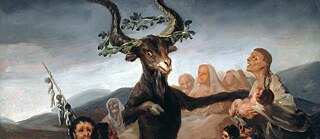A Time-Out for Some Self-Critical Reflection
“All the wheels shall stand still...”
“Alle Räder stehen still, wenn dein starker Arm es will” — “All the wheels shall stand still if thy strong arm so wills.” This line from the German labor anthem of 1863 has gained new relevance since the pandemic.
Public life ground to a sudden halt at the onset of the COVID crisis. Besides the mortal danger to individual health, commentators invariably brought up the looming threat to the German economy, which had already been in crisis mode for years and still hasn’t overcome the enduring aftereffects of the last stock market crashes. To take on what it calls the biggest challenges since the end of World War II, Germany’s new coalition government led by the Social Democrats (SPD) has introduced economic stimulus packages designed to bring about the “social-ecological transformation” of society. But these measures remain committed to the paradigm of unlimited growth, whose destructiveness and historical unsustainability are becoming increasingly manifest. At the outbreak of the COVID pandemic, some were hoping that it would force us all to stop and think for a while and that our self-critical reflection would lead to a fundamental revision of our exploitative economic system. These hopes were soon dashed.
Break the double yoke in twain!
Break the poverty of slavery!
Break the slavery of poverty!
Bread is freedom, freedom bread!
So the working class is to bring work to a standstill — not in order to improve their pay but to abolish a system of production that makes the rich richer and the poor poorer, increasingly widening social divisions.
 Postcard, circa 1910. Printed by Rauh & Pohle, Leipzig
| © Rauh & Pohle, Leipzig via Wikimedia Commons
Postcard, circa 1910. Printed by Rauh & Pohle, Leipzig
| © Rauh & Pohle, Leipzig via Wikimedia Commons
“Workingman, wake up!”
The “dialectic of standstill” informed the very birth of the SPD as the country’s first labor party. In 1863, for the founding of the Allgemeiner Deutscher Arbeiterverein (General German Workers’ Association), later renamed the Social Democratic Party of Germany (SPD), the revolutionary poet Georg Herwegh wrote a poem that was then set to music and became the party’s anthem. The most famous lines of this “strike song” are probably the refrain:Mann der Arbeit, aufgewacht!
Erkenne Deine Macht!
Alle Räder stehen still,
wenn Dein starker Arm es will.
Erkenne Deine Macht!
Alle Räder stehen still,
wenn Dein starker Arm es will.
Workingman, wake up!
And know thy might!
All wheels shall stand still
If thy strong arm so wills!
And know thy might!
All wheels shall stand still
If thy strong arm so wills!
The song was soon banned but secretly spread across the nation. It is still one of the most widely known songs of the labor struggle today, probably above all because it seems to glorify labor itself in its evocation of proletarian power.
“Break the double yoke!”
The “strike song” culminates in the final verse in a call for revolutionary liberation from the curse of hard work:Brecht das Doppeljoch entzwei!
Brecht die Not der Sklaverei!
Brecht die Sklaverei der Not!
Brot ist Freiheit, Freiheit Brot!
Brecht die Not der Sklaverei!
Brecht die Sklaverei der Not!
Brot ist Freiheit, Freiheit Brot!
Break the double yoke in twain!
Break the poverty of slavery!
Break the slavery of poverty!
Bread is freedom, freedom bread!
So the working class is to bring work to a standstill — not in order to improve their pay but to abolish a system of production that makes the rich richer and the poor poorer, increasingly widening social divisions.
Alles ist Dein Werk!
O Sprich, alles, aber nichts für Dich! Und von allem nur allein,
die Du schmiedst, die Kette, Dein.
Everything is thy work!
Everything, that is, but nothing for thee!
And of everything thou forgeth,
only the chain is thine.
O Sprich, alles, aber nichts für Dich! Und von allem nur allein,
die Du schmiedst, die Kette, Dein.
Everything is thy work!
Everything, that is, but nothing for thee!
And of everything thou forgeth,
only the chain is thine.
“But nothing for thee!”
Workers nowadays, at least in Western countries, have far more to lose than their chains, but our society’s evolution over time has given rise to completely new problems and threats that give the old labor anthem new relevance.Was ihr webt, es ist der Fluch,
für Euch selbst – ins bunte Tuch.
What you weave into colored cloth
Is the curse for yourselves.
für Euch selbst – ins bunte Tuch.
What you weave into colored cloth
Is the curse for yourselves.
And now, that curse has been compounded by the inexorable advance of climate change, attended by scenarios of impending doom that make the COVID pandemic seem a lesser evil.
And yet, despite the existential threat to our very survival, the fixation on economic growth goes unchallenged — on the contrary, under the pressure of increasingly cutthroat global competition, governments are setting ever bigger wheels in motion to boost the economy. “Stillstand ist Rückschritt,” one German top manager put this premise in a nutshell: If you don’t go forward, you go backward.
And yet, despite the existential threat to our very survival, the fixation on economic growth goes unchallenged — on the contrary, under the pressure of increasingly cutthroat global competition, governments are setting ever bigger wheels in motion to boost the economy. “Stillstand ist Rückschritt,” one German top manager put this premise in a nutshell: If you don’t go forward, you go backward.
Striking as revolutionary stasis
But not everyone would concur. The consolidation of social democracy, which by the turn of the century had already become a mainstay of society under the banner of progress and labor, also repeatedly gave rise to countercurrents that viewed striking as a weapon in the struggle for fundamental social change. Walter Benjamin’s idea of the revolutionary general strike is a case in point. A general strike is held not “with a readiness to go back to work after some superficial concessions and one improvement or another in working conditions,” but in order to radically transform the nature of work. For the time being, it’s mostly members of the new generation who, in view of the imminent threat to our future, are engaging in civil disobedience and blocking roads, airports, and bridges to force policymakers to comply with the state’s obligation to safeguard natural resources as set forth in Article 20a of the Basic Law of the constitution of the Federal Republic of Germany. The polarized views of standstill, as an evil of idleness or as a starting point for the creation of new social relations and a new relationship to nature, reflect contradictions in society that can hardly be reconciled under the existing order. Postcard, circa 1910. Printed by Rauh & Pohle, Leipzig
| © Rauh & Pohle, Leipzig via Wikimedia Commons
Postcard, circa 1910. Printed by Rauh & Pohle, Leipzig
| © Rauh & Pohle, Leipzig via Wikimedia Commons






